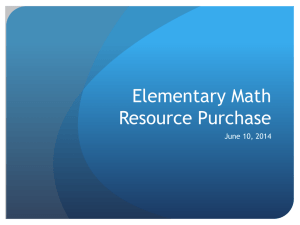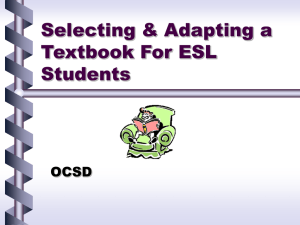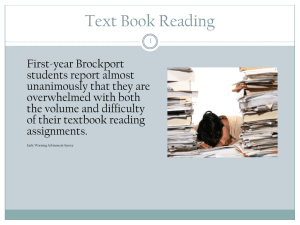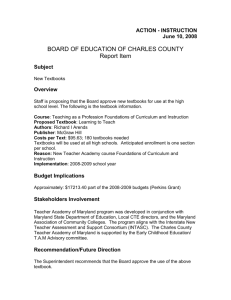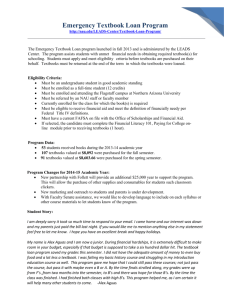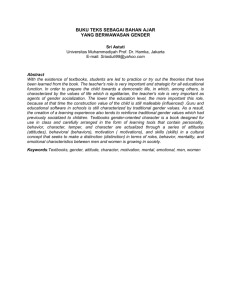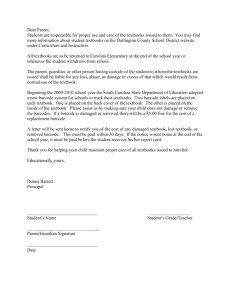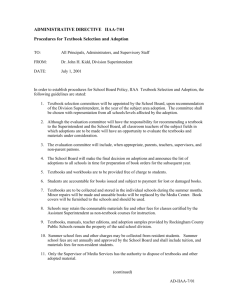Reclaiming pedagogical space: Teaching without a textbook
advertisement
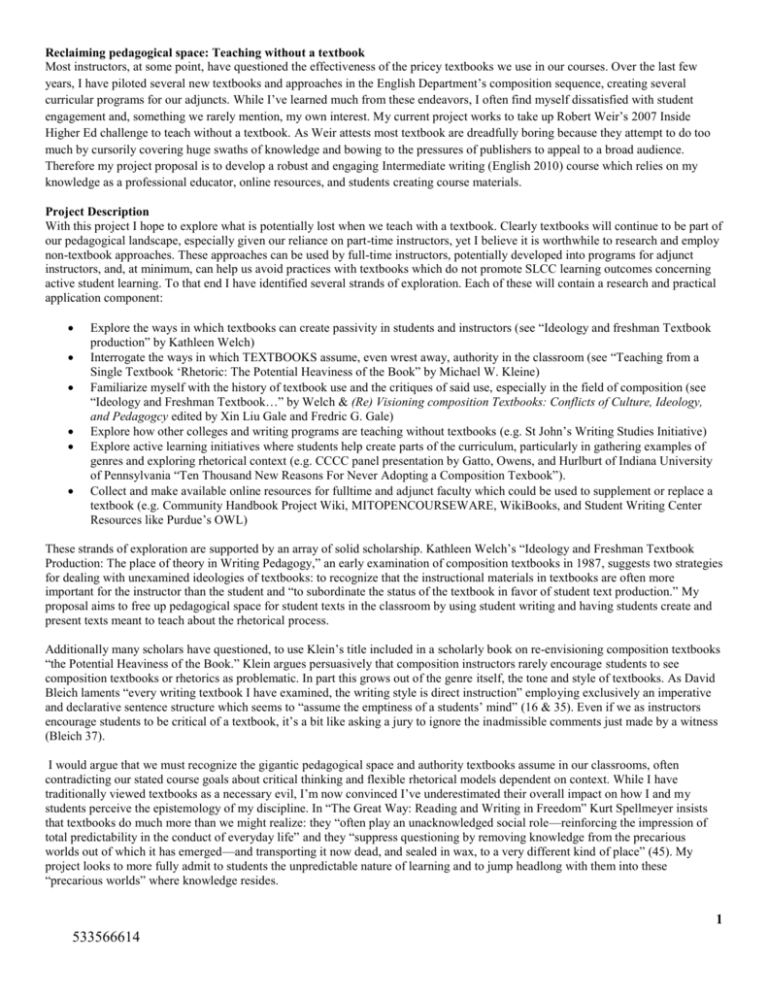
Reclaiming pedagogical space: Teaching without a textbook Most instructors, at some point, have questioned the effectiveness of the pricey textbooks we use in our courses. Over the last few years, I have piloted several new textbooks and approaches in the English Department’s composition sequence, creating several curricular programs for our adjuncts. While I’ve learned much from these endeavors, I often find myself dissatisfied with student engagement and, something we rarely mention, my own interest. My current project works to take up Robert Weir’s 2007 Inside Higher Ed challenge to teach without a textbook. As Weir attests most textbook are dreadfully boring because they attempt to do too much by cursorily covering huge swaths of knowledge and bowing to the pressures of publishers to appeal to a broad audience. Therefore my project proposal is to develop a robust and engaging Intermediate writing (English 2010) course which relies on my knowledge as a professional educator, online resources, and students creating course materials. Project Description With this project I hope to explore what is potentially lost when we teach with a textbook. Clearly textbooks will continue to be part of our pedagogical landscape, especially given our reliance on part-time instructors, yet I believe it is worthwhile to research and employ non-textbook approaches. These approaches can be used by full-time instructors, potentially developed into programs for adjunct instructors, and, at minimum, can help us avoid practices with textbooks which do not promote SLCC learning outcomes concerning active student learning. To that end I have identified several strands of exploration. Each of these will contain a research and practical application component: Explore the ways in which textbooks can create passivity in students and instructors (see “Ideology and freshman Textbook production” by Kathleen Welch) Interrogate the ways in which TEXTBOOKS assume, even wrest away, authority in the classroom (see “Teaching from a Single Textbook ‘Rhetoric: The Potential Heaviness of the Book” by Michael W. Kleine) Familiarize myself with the history of textbook use and the critiques of said use, especially in the field of composition (see “Ideology and Freshman Textbook…” by Welch & (Re) Visioning composition Textbooks: Conflicts of Culture, Ideology, and Pedagogcy edited by Xin Liu Gale and Fredric G. Gale) Explore how other colleges and writing programs are teaching without textbooks (e.g. St John’s Writing Studies Initiative) Explore active learning initiatives where students help create parts of the curriculum, particularly in gathering examples of genres and exploring rhetorical context (e.g. CCCC panel presentation by Gatto, Owens, and Hurlburt of Indiana University of Pennsylvania “Ten Thousand New Reasons For Never Adopting a Composition Texbook”). Collect and make available online resources for fulltime and adjunct faculty which could be used to supplement or replace a textbook (e.g. Community Handbook Project Wiki, MITOPENCOURSEWARE, WikiBooks, and Student Writing Center Resources like Purdue’s OWL) These strands of exploration are supported by an array of solid scholarship. Kathleen Welch’s “Ideology and Freshman Textbook Production: The place of theory in Writing Pedagogy,” an early examination of composition textbooks in 1987, suggests two strategies for dealing with unexamined ideologies of textbooks: to recognize that the instructional materials in textbooks are often more important for the instructor than the student and “to subordinate the status of the textbook in favor of student text production.” My proposal aims to free up pedagogical space for student texts in the classroom by using student writing and having students create and present texts meant to teach about the rhetorical process. Additionally many scholars have questioned, to use Klein’s title included in a scholarly book on re-envisioning composition textbooks “the Potential Heaviness of the Book.” Klein argues persuasively that composition instructors rarely encourage students to see composition textbooks or rhetorics as problematic. In part this grows out of the genre itself, the tone and style of textbooks. As David Bleich laments “every writing textbook I have examined, the writing style is direct instruction” employing exclusively an imperative and declarative sentence structure which seems to “assume the emptiness of a students’ mind” (16 & 35). Even if we as instructors encourage students to be critical of a textbook, it’s a bit like asking a jury to ignore the inadmissible comments just made by a witness (Bleich 37). I would argue that we must recognize the gigantic pedagogical space and authority textbooks assume in our classrooms, often contradicting our stated course goals about critical thinking and flexible rhetorical models dependent on context. While I have traditionally viewed textbooks as a necessary evil, I’m now convinced I’ve underestimated their overall impact on how I and my students perceive the epistemology of my discipline. In “The Great Way: Reading and Writing in Freedom” Kurt Spellmeyer insists that textbooks do much more than we might realize: they “often play an unacknowledged social role—reinforcing the impression of total predictability in the conduct of everyday life” and they “suppress questioning by removing knowledge from the precarious worlds out of which it has emerged—and transporting it now dead, and sealed in wax, to a very different kind of place” (45). My project looks to more fully admit to students the unpredictable nature of learning and to jump headlong with them into these “precarious worlds” where knowledge resides. 1 533566614

